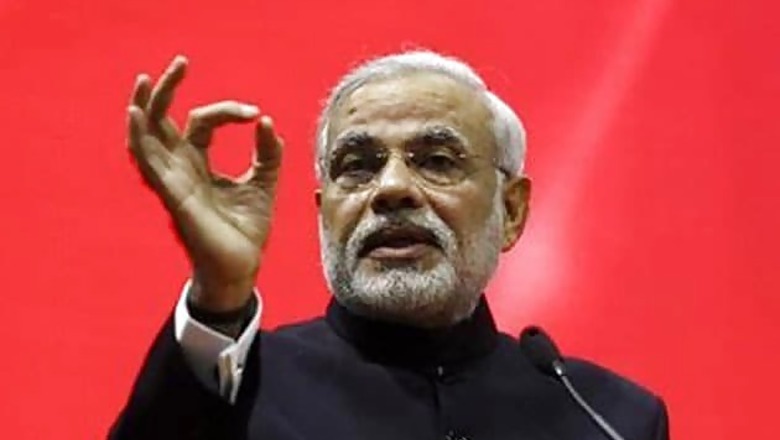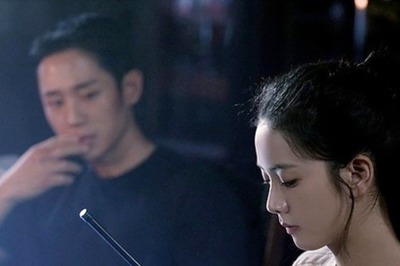
views
Gandhinagar: Mukesh Ambani, India's most powerful businessman and Asia's second-richest person, would not ordinarily sit on a stage for three-and-a-half hours without access to a cellphone, but this was not just anybody's event.
Narendra Modi, the Chief Minister of Gujarat and potentially India's next prime minister, drew a rock star's reception from the cream of India's tycoon class as well as diplomats at his "Vibrant Gujarat Summit" last week.
In one memorable image from the event to promote investment in a state that has become an industrial powerhouse, the white-bearded Modi, assembled diplomats and the country's top business leaders, including the Ambani brothers, raised hands together as the packed auditorium cheered.
"He's getting hero worship today. Quite dramatic," said Robin Phinney, CEO of Karnalyte Resources, a Canada-based potash miner in which state-owned Gujarat State Fertilizers and Chemicals took a 20 percent stake last week, said at the start of the three-day event on Friday.
"When I came here I had no idea this was going on. Seems like the industry really likes what he's doing," he told Reuters.
Tycoons and diplomats lavished praise on Modi, seeming eager to mark their presence in front of the man many in business feel should lead India despite a controversial past that makes him one of the country's most divisive politicians.
Modi avoids talk of higher office, but his popularity in the state, as well as with business and many in India's emerging urban middle class, is fueling speculation he will lead his Bharatiya Janata Party (BJP) against the ruling Congress in national elections to be held by 2014.
His record as a pro-business leader presiding over a state government that wins praise for efficient administration stands in contrast to the eight-year tenure of Prime Minister Manmohan Singh's government, which has been stymied by fractious coalition partners and a string of corruption scandals.
While big business tends to hedge its bets by backing both the main national parties in elections, industry's support for Modi could prove a powerful source of fund-raising if he becomes the party's standard-bearer.
The black mark against Modi, 62, is the accusation by critics that he did not do enough to stop - or even quietly encouraged - religious riots in 2002 that killed as many as 2,000 people, most of them Muslims.
That episode led the United States to deny Modi a visa in 2005, although US-India Business Council President Ron Somers praised Modi at the investment summit for enabling Gujarat's "stunning progress".
Peter Hass, the US Consul General in Mumbai, also attended the event on Friday but did not appear on stage. However, British High Commissioner James Bevan was among those joining hands onstage on Friday, and in his remarks focused on the close links between Gujarat and the United Kingdom, which has a large Gujarati community.
In October, the British envoy visited Modi to discuss business and investment, ending a 10-year UK diplomatic boycott imposed on him for failing to stop the Gujarat riots.
'A LORD OF MEN'
Some of the most effusive praise came from Anil Ambani, Mukesh's younger brother and head of India's third-largest telecoms company, who called him "a lord of men" and asked for a standing ovation for the chief minister.
The Ambani brothers, who are of Gujarati origin, both exchanged hugs onstage with Modi at Friday's standing-room-only opening ceremony in a 5,000-seat auditorium, but kept their distance from each other. In 2005, they famously split the conglomerate founded by their father and have since remained apart although they have withdrawn rival legal claims.
Ratan Tata, the recently-retired chairman of India's biggest corporate, the Tata group, praised Modi's efficient administration. His successor, Cyrus Mistry, appearing nervous in his first public speech since taking over late last month, thanked Modi during Saturday's closing session for personally inviting him.
Modi first held the Vibrant Gujarat event in 2003 to attract investment after the violence and an earthquake in 2001, and over the years it has become an increasingly big stage for Modi to market the state, and himself. As is often the case with events that Modi attends, cellphone signals were jammed for security purposes.
"We are here because we want to be part of the economic miracle that is Gujarat. We are hoping to deepen this relationship," Canada's minister for immigration and multi-culturalism, Jason Kenney, told delegates. Canada, along with Japan, was a partner country for the event.
Modi, fresh from a resounding December win in state legislative elections for the BJP, sat mostly unsmiling during the fulsome adulation. "All these people who are greeting us, trying to speak our language, they just want to be part of our economic success," he said as the event closed.




















Comments
0 comment